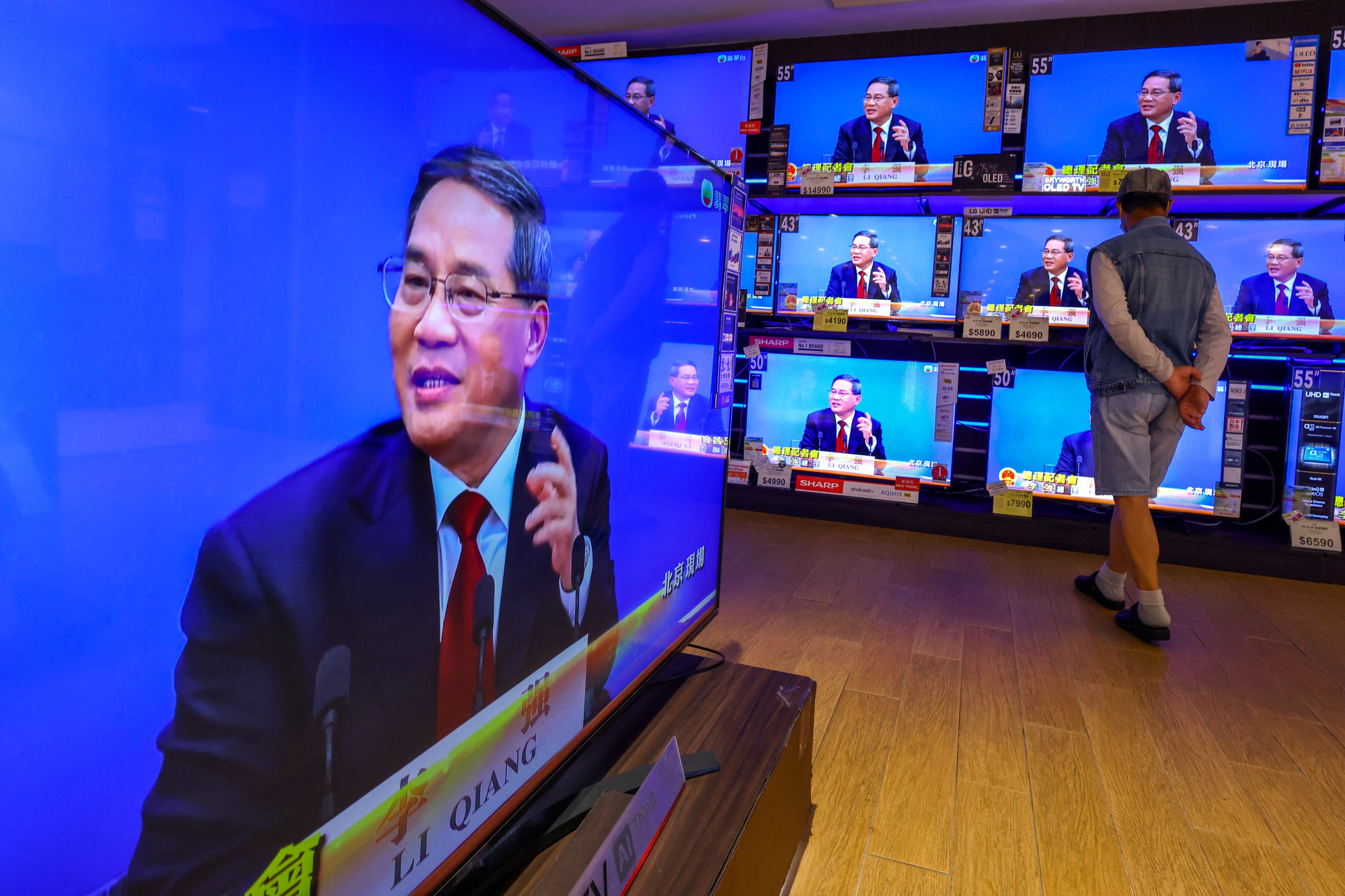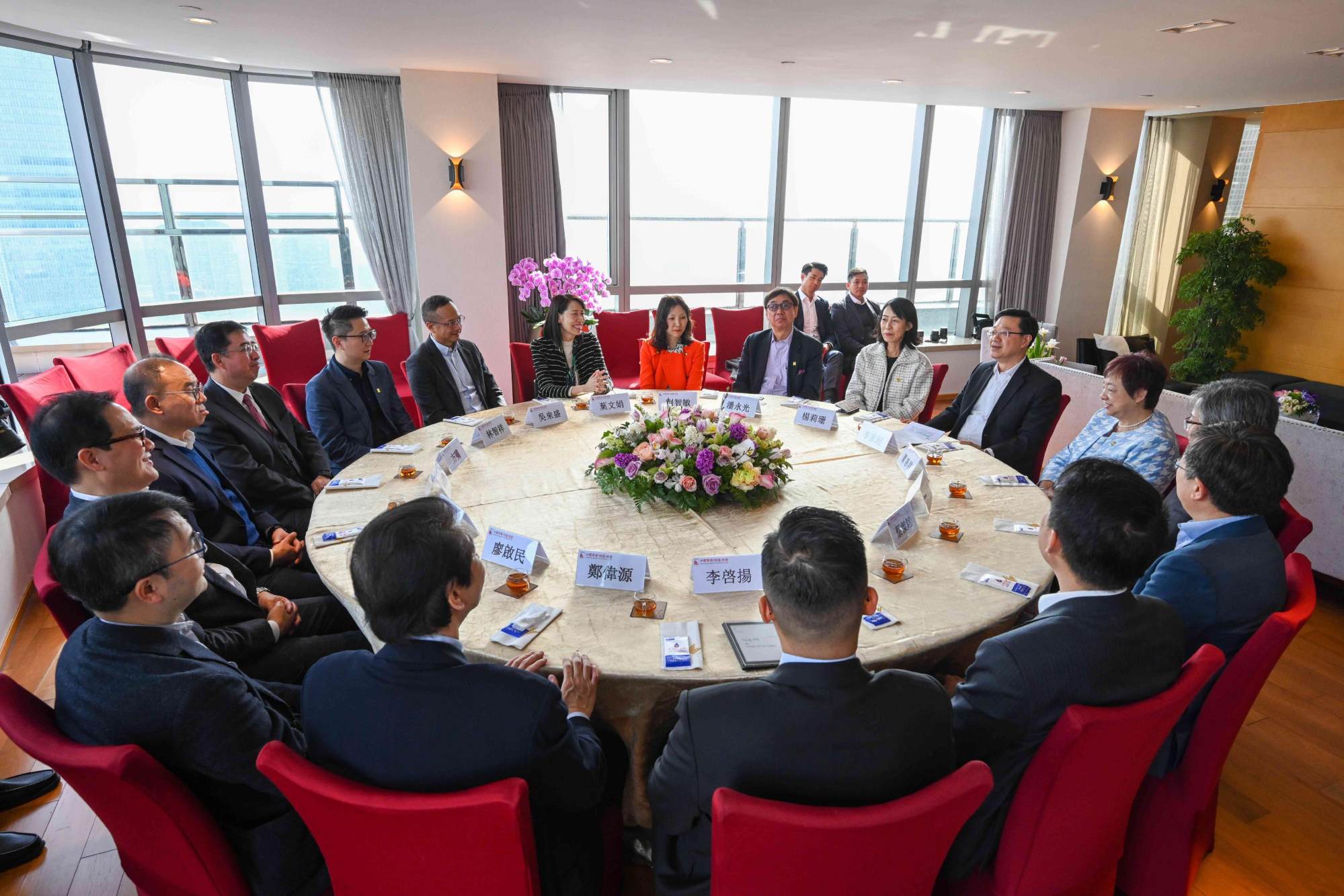
China’s ‘two sessions’ 2023: Xi Jinping ties Hong Kong’s future to country’s, vows to ‘firmly’ push forward ‘one country, two systems’
- In delivering closing speech, Xi Jinping pledges support for Hong Kong, saying its long-term prosperity and stability ‘inseparable’ from creation of strong country
- City leader John Lee, who is visiting capital, says Hong Kong will contribute to country’s rejuvenation in ‘deeper, wider and better way’
“Promoting the building of a strong country is inseparable from the long-term prosperity and stability of Hong Kong and Macau,” Xi told the more than 3,000 delegates to the National People’s Congress (NPC) gathered in the Great Hall of the People.
“We must comprehensively, accurately and unswervingly implement one country, two systems, Hong Kong people governing Hong Kong, Macau people governing Macau, and a high degree of autonomy.”
The president, elected to an unprecedented third term, also pledged to support the economic development and improvement of people’s livelihoods in the two special administrative regions.
Xi spoke about Hong Kong after highlighting the country’s need to balance growth and security as it pursued national rejuvenation. He also promised the country would not shut itself off from the rest of the world and would take part in global development and governance.
The president also for the first time called for the “firm advancement” of the one country, two systems governing principle.
Hong Kong leader pledges to gain more support from Beijing as he heads to capital
“We must firmly advance the practice of one country, two systems and realise the reunification of the motherland,” he said during the 15-minute speech.
He then mentioned Taiwan and emphasised the need to stick to the party’s “holistic strategy in the new era” to settle the future of the self-ruled island, which Beijing views as a renegade province.
“[We] resolutely oppose interference by external forces and separatist activities for ‘Taiwan independence’ and unswervingly advance the process of reunification of the motherland,” he said.

In 2018, he pledged to implement one country, two systems “comprehensively and fully”, highlighted his support for Hong Kong’s leader and stressed the need to boost the patriotism of the city’s residents. In 2013, he appealed to Hongkongers to contribute to the city’s prosperity and stability.
At a press conference after the ceremony, newly promoted Premier Li Qiang highlighted the central government’s support for Hong Kong’s to increase its “international competitiveness”.
He added the difficulties the two cities had faced in economic development in recent years were only “temporary”.
“The economic development of Hong Kong and Macau has encountered some difficulties in recent years as affected by various factors, but these were only temporary difficulties that arose during the course of development,” Li said.
Xi Jinping says new policy is crucial for stronger army and nation
“With the strong backing of the motherland and the guarantee of one country, two systems, the status and role of Hong Kong and Macau will only be strengthened, not weakened,” he said. “The future of Hong Kong and Macau will definitely be even better.”
Professor Lau Siu-kai, a consultant at the Chinese Association of Hong Kong and Macau Studies, a semi-official think tank, said Hong Kong had an important role to play amid a global economic downturn and continued deterioration in Sino-US relations, given the city was a showcase for economic success.

“As an international metropolis, Hong Kong can assist China in promoting regional economic cooperation and help to promote China’s opening up to the outside world, especially in the Middle East and Asean countries, which can, in a way, offset the suppression of the United States and the West,” he said, referring to the Association of Southeast Asian Nations.
Lau added that Hong Kong remained a clear reference point for Taiwan on the successful implementation of one country, two systems, especially as independence forces continued to collude with the United States.
“Hong Kong must maintain prosperity and stability and attract the support of the international community and Taiwan compatriots.” Lau said. “If the practice of one country, two systems works well, Taiwan people might consider it an acceptable arrangement.”
Hong Kong delegates urged to take more active role in developing Greater Bay Area
Starry Lee Wai-king, the city’s sole new member of the NPC Standing Committee, linked Xi’s emphasis on Hong Kong to tensions between Beijing and Washington, which she expected would continue.
She also predicted the city’s ability to help elevate mainland Chinese firms to a global level would also become more significant.
“Hong Kong should also speed up its drive to attract talent in helping the country to pursue technology independence amid the ongoing tensions,” she said.
Starry Lee added the new line-up of the standing committee would meet on Tuesday.
Starry Lee becomes sole Hong Kong member of nation’s top legislative body
Ma Fung-kwok, the head of Hong Kong’s NPC delegation, said Xi’s remarks were “a reminder” for the local government to pursue breakthroughs in solving deep-rooted livelihood issues and prevent crises in governance that could hold back national development.
“Anything that goes wrong in Hong Kong definitely affects the country,” he said. “History has proved this.”
Also on Monday, John Lee met members of the Hong Kong Chamber of Commerce in China to learn more about the development of the city’s companies on the mainland.

Lee said he was confident the resumption of normal travel between Hong Kong and the mainland meant more businessmen from the city would pursue careers over the border and grasp opportunities offered by national development.
He said he would start to pay visits to ministries on Tuesday, accompanied by the heads of bureaus.
Sources said Lee would lead off with meeting senior officials overseeing finance, insurance and securities regulation.
Secretary for Culture, Sports and Tourism Kevin Yeung Yun-hung met Gao Zhidan, the director of the General Administration of Sport of China, in the capital on Monday to learn about sports development on the mainland and explore opportunities for exchanges and cooperation.


